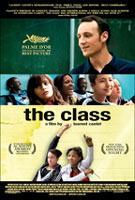The inspirational teacher narrative has been told countless times in American movies, almost always with the same structure. An entire year's worth of frustration, anger, boredom and occasional insight is condensed into a series of teachable moments; the illiterate kid learns to write his name, the angry girl reveals abuse at home, the teacher finally understands how to communicate on their level. At the end of the year something is inevitably learned, with no acknowledgement that, come September, the inexorable cycle will begin anew.
The Class, based on the memoir by Francois Begaudeau, who also stars, isn't exactly interested in turning that traditional narrative on its head. Instead it starts from the only world Begaudeau knows-- reality-- and creates a loose narrative as fascinating in its specific details as it is enlightening on a grand scale. Though it tackles very specifically French ideas of race and identity and education, The Class is a universal story of the joys and horrors of the classroom, both for anyone who has sat through an endless afternoon class and those who stand before the indifferent hordes of students, desperately trying to make a difference.
The movie, which director Laurent Cantet and Begaudeau devised without any specific plot in mind, follows a year at a Paris school largely populated by children of immigrants from West Africa or the Middle East. The students, none of them actors and most of whom use their real names, squabble with one another, spar with their teacher, and pay attention about as often as they shoot off text messages. Begaudeau plays their French teacher, Mr. Marin, who does his best to relate to them and earns their respect for it-- except, of course, when they regard him as just another out-of-touch grownup who uses only "honky" names for classroom examples.
The camera drifts after Marin through faculty meetings and the classroom, as he deals with daily challenges, from verb conjugation to student discipline. Scenes go on endlessly, with the handheld camera lingering on a sleeping student or an active one, as the whole classroom debates the meaning of "ashamed," or tries to write their autobiographies. It's gripping, believe it or not. A handful of students emerge as lead characters, including the spirited Khoumba (Rachel Regulie) who eloquently defends her nasty attitude, and Souleymane (Franck Keita), the angry son of immigrants who seems unable, not unwilling, to connect to anyone around him.
The film reaches a kind of climax when Marin's job is threatened by some heated remarks he made to some female students, and the faculty must decide whether Souleymane can stay in school, but Cantet and Begaudeau avoid any kind of false conclusion or melodrama. The message in the end is that there is no message-- people do their best, win sometimes and lose sometimes, and after a summer it starts all over again. Neither depressing or uplifting, The Class simply exists as it is, a dispatch from a familiar world that has still never seemed to real.
Your Daily Blend of Entertainment News
Staff Writer at CinemaBlend


